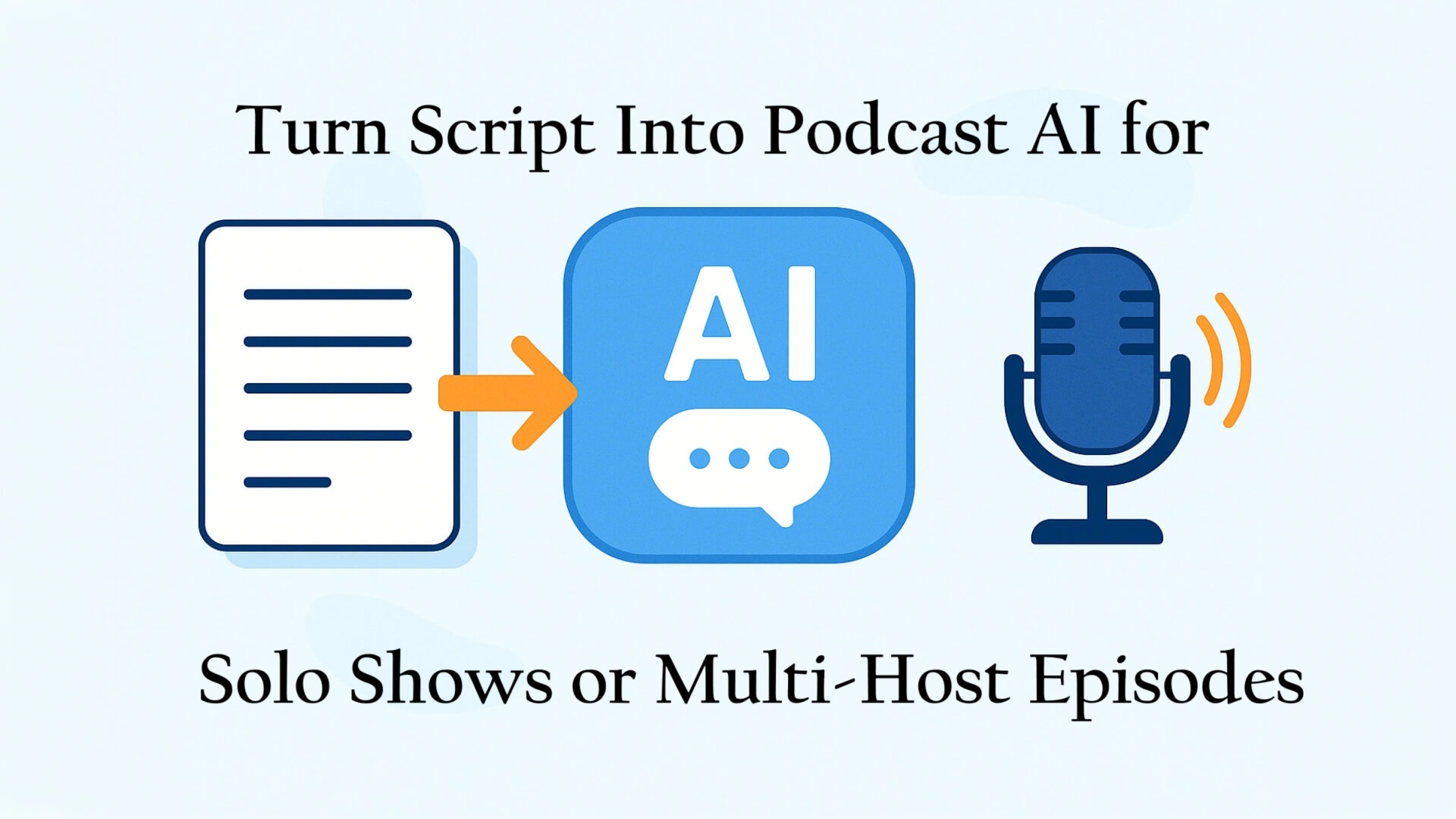Podcasts are a key communication medium, sharing ideas, stories, and information. Many listen during commutes, workouts, or chores. Creators must also engage audiences who prefer audio over written content. This necessitates the time-consuming and labor-intensive activities of scripting, voice recording and audio editing. The demanding nature of these activities can now be mitigated by the use of AI tools. As an example, AIPodify provides the ability to turn script into podcast ai for solo as well as multi-host podcasts.
Preparing the Podcast Script
The podcast creation process begins with the preparation of the podcast script. The text of a podcast script comes from somewhere – a blog, article, document, or even a video transcript. Keep in mind, people are going to listen to a podcast, which means all script content has to be readable in an auditory sense. AI tools like AIPodify can convert content to a podcast format. AIPodify optimizes text, adds pauses, and converts it to speech, streamlining the process and saving time. It can then be tailored to the podcast type, whether solo or multi-host with two or more participants. AIPodify makes it easy to format scripts to podcast styles, allowing the creation of multiple podcast variations from a single piece of content.
Solo Shows
A podcast can have only one host for a solo show. In this format, the audience directly addresses the host, who shares ideas, stories, or information. AI podcast generators help the solo show stay professional by reading scripts naturally. Because the AI performs the reading, the script may be altered and adjusted before the recording. For instance, if some sentences sound too formal, some sections are too short, or other parts are too lengthy. A variety of episode lengths can be adjusted as well. For instance, a short episode is only a couple of minutes, whereas longer episodes exceed the ten-minute mark. This is beneficial in adapting to the content style and requirements.
Multi-Host Episodes
The distinguishing feature of multi-host episodes is the dialogue between two or more podcast presenters. Interactions also enhance the liveliness of the podcast experience. Various AI solutions can be used to give each host a distinct voice. This feature helps the audience distinguish podcast speakers and follow the exposition easily, as it’s apparent when a dialogue involves many participants. Conversational flow can be further enhanced by AI and the host tweaking the dialogue to a more conversational style. For instance, portions of the speeches can be broken up with question and answer segments, and interspersed turns can be constructed to allow the audience a breather from listening. It helps the podcast sound fluid instead of robotic and clunky. Multi-host episodes also provide the ease of editing to the content creators with respect to length, tone and style. This is very important, as it helps to maintain the intended message of the episode and to control the final product.
Generating the Podcast Audio
Once the script is ready, the next step is to utilize AI technology to produce the podcast audio. It has truly remarkable and stunningly realistic, seamless voice options. Moreover, there are several voice selections to ensure the podcast audio aligns with the preferred style, whether serious, informal, or story-centric. Advanced AI technology has made podcast audio production more efficient, as creators who used to record and edit for hours or days can now have a finished product, complete with audio, ready in minutes. This efficiency can help creators focus more on their content as opposed to the technical aspects.
Advantages of AI Podcasting
Using AI in podcasting has a multitude of benefits. For one, AI makes it easier and quicker to make a podcast on a regular basis. The extensibility of use cases of podcasts elevates the potential audience reach, which is not influenced by the size of the audience’s physical footprint. Also, there are use cases like driving where podcasts can be consumed because they are screenless media. AI technologies will help podcasters reach global markets by making multilingual podcasts. Podcasting also benefits from AI in terms of flexibility. Podcasters can determine the style, length, number of hosts, tonal attributes, and other attributes of the podcast. The ability to use the AI tools to edit the podcast numerous times until they align with the creator’s vision makes the process of podcast creation easier.
Conclusion
AI tools, such as AIPodify, greatly facilitate the process of creating podcasts from scripts. Solo performances remain an option, in which the presenter speaks directly to the spectator, as well as a dialogue format involving multiple presenters. Artificial intelligence efficiently facilitates the crafting of cohesive podcasts through script adjustments to ensure realistic exchanges among co-hosts, virtual host voice simulations, and the rapid synthesis of premium audio materials. The employment of AI podcast generators enables content producers to optimize time without relinquishing ownership of their materials, thus expanding their outreach potential. Solo episodes and varying audio discussions with multiple participants become more straightforward and enjoyable to engage with. Such innovations allow creators to concentrate on the more important aspects of the ideation or storytelling process, leaving the complexity of audio podcast production to the intelligent automated systems.

